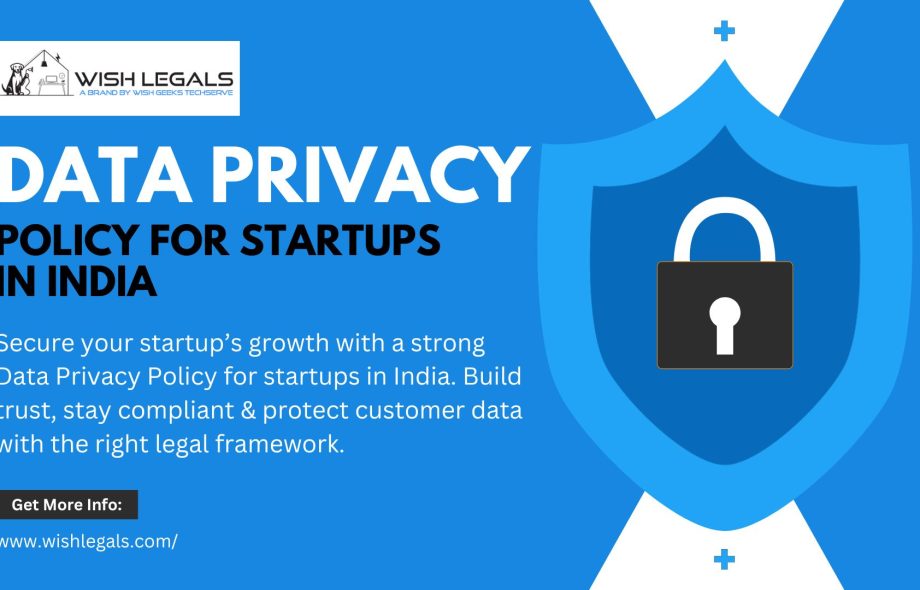In the modern world of digital technology, data is the new currency. Every startup, no matter if it’s in health care, fintech, ecommerce or SaaS, rely on data from users to invent develop, expand, and be competitive. But with this dependency comes a greater responsibility-protecting customer Data Privacy Policy for startups in India. If you don’t adhere to the proper guidelines for data privacy can not only result in damage to reputation, but could also result in legal sanctions. This is why knowing the guidelines for data privacy that each Indian startup must know isn’t a choice but an absolute requirement.
Why Data Privacy Matters for Startups
Startups thrive when they have trust. Customers are more likely to give out personal information when they are confident that their information is safe. One data breach could ruin trust and result in long-term damage. With the increasing incidence of cybercrimes, phishing and misuse of data, India has made the protection of data a top priority.
By adhering to the appropriate policies on data privacy Startups can:
-
Make sure you are in compliance to Indian regulations, like that of Digital Personal Data Protection Act (DPDPA) 2023.
-
Avoid paying large fines and penalties.
-
Create a brand image that is trustworthy.
-
Security of sensitive customer data like financial records, phone numbers and information about identity.
Data Privacy Policy for Startups in India
For any startup operating in India making an transparent and fully compliant data privacy policy can be the very first move towards securing trust among users. Wish Legals provides structured guidance for startups on how to write and then implement these policies. A robust policy makes sure that customers know what data they are collecting and used, stored and secured.
Here are the basic elements that every privacy policy should include:
- Data Collection Transparency
-
Be clear about the type of information is being collected (email or phone number or financial information, surfing data).
-
Determine if the data is obtained directly (through sign-up questionnaires) in a different way (through Cookies).
-
-
Purpose of Data Usage
-
Be transparent about why the data is being collected–marketing, communication, analytics, or service improvement.
-
-
Data Sharing Practices
-
Indicate clearly if third party (such as delivery partners, payment gateways as well as analytics instruments) are able to access.
-
-
User Rights
-
Customers have the right to view their data, alter or request the deletion of their personal information at anytime.
-
-
Data Security Measures
-
Make sure to mention the encryption feature, secured servers and regularly audited to assure clients that their information is secure.
-
-
In compliance in Indian Law
-
Check that your policy conforms to your policy’s requirements under the DPDPA-2023 and the relevant IT rules.
-
With Wish Legals, we help entrepreneurs create custom privacy policies for their data that align with legal compliance as well as business requirements. Our strategy ensures you are secure and focused on growing.
Key Data Privacy Rules Every Startup Must Follow
-
Compliant with DPDPA 2023
The Digital Personal Data Protection Act (2023) is India’s most important privacy law. It demands explicit consent for data collection and minimization of data (collect only the data that is necessary) and robust security measures. -
Consent-based Data Collection
Be sure to take data collection with clear consent. The pre-ticked boxes or vague statements do not have any legal validity anymore. -
Restrictions on Data Storage
Businesses need to ensure that data is safely stored within India or in accordance with international agreements. Cloud storage solutions must comply to Indian law. -
Notice of Breach
In the event of an incident of data breach occurs the company is legally obligated to notify customers and the authorities within a specific time frame. -
Children’s Data Protection
Startups need to make extra efforts when collecting data from children younger than 18 years old by ensuring parental consent and more secure security measures. -
Trans-Border Transfers of Data
In the event that your company has international clients, you must ensure that crossing-border transfers are in accordance with Indian government regulations.
How Startups Can Stay Ahead
-
Employ an Data Protection Officer (DPO): For companies with larger scales, an DPO is responsible for ensuring compliance and monitoring the practices of security for data.
-
Train Your Team employees who handle customer data must be educated on privacy guidelines.
-
Use encryption: Always encrypt sensitive data both at rest and during transit.
-
Regular Audits Audits conducted internally to determine if there are any compliance issues.
-
Stay Current: As privacy laws change, be sure to check and update your privacy policy frequently.
Final Thoughts
For Indian businesses, data privacy is not just a compliance checkbox to check off, it is a basis on which trust can be built. By adhering to the regulations of the DPDPA and keeping a robust data privacy policy You not only ensure your customers’ safety but also secure your business for the future.
With Wish Legals, we specialize in helping startups navigate the complex maze of Indian privacy regulations for data. From writing compliant policies to providing long-term security We make sure that you’re protected throughout the growth of your company.
Don’t be a risk to your startup’s future. Secure your information today by implementing the most robust privacy policies. Make contact with Wish Legals to protect your company now!
CTR Line (Call-to-Action for a High Click Rate):
Are you ready to make sure your startup is fully data-compliant? Click here to talk the experts at Wish Legals and have your data privacy Policy to India now!
 :
https://in.pinterest.com/wishlegal/
:
https://in.pinterest.com/wishlegal/

